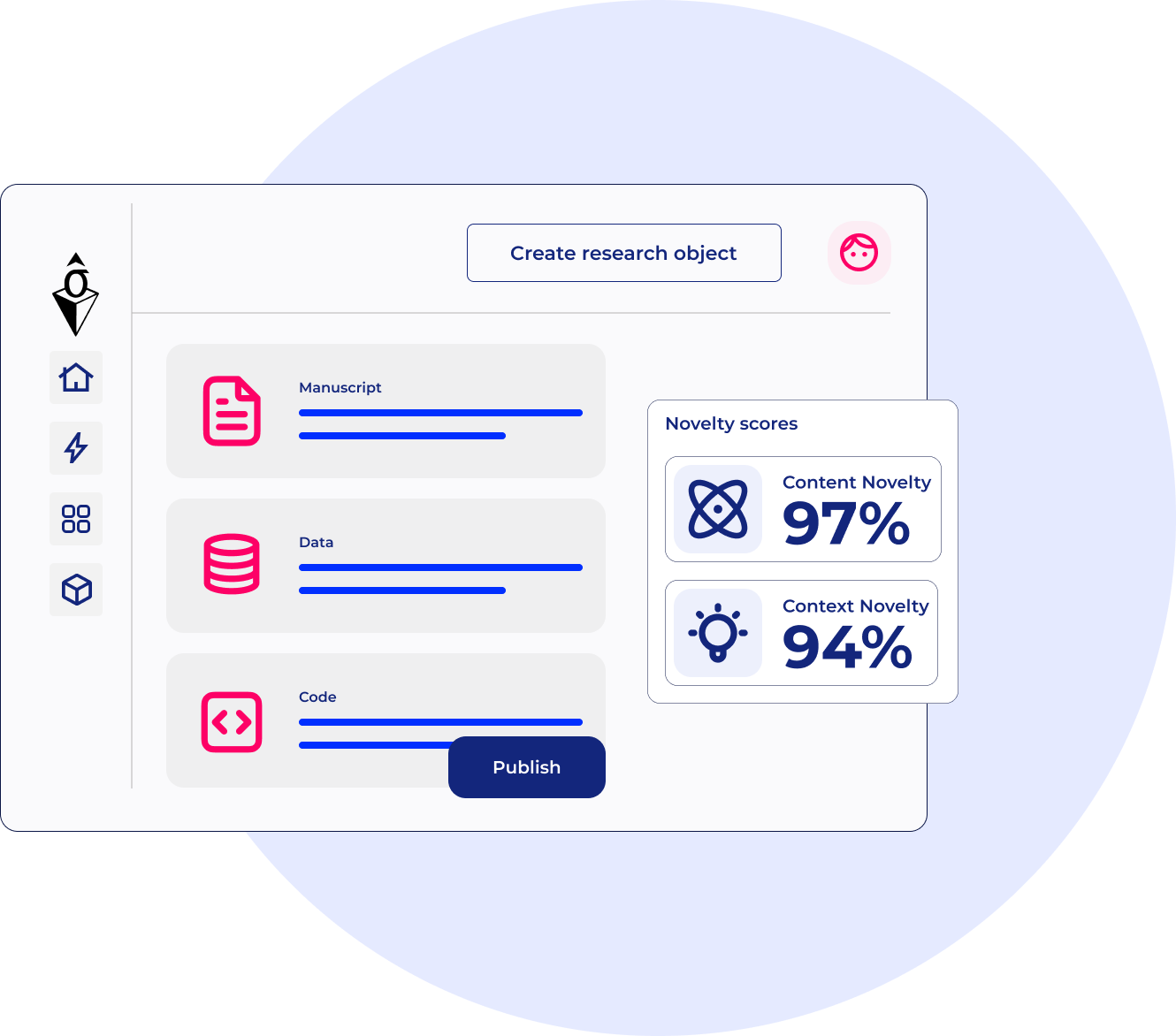DeSci Publish is an open-source preprint network that makes it easy and rewarding to publish scientific research - without paywalls or publication fees. Whether you're sharing a manuscript, dataset, or code, DeSci Publish brings all research components into one integrated space.

DeSci Publish enables you to focus on advancing your research rather than managing complex workflows. Here’s how we help you reach your research goals faster and with more impact.
Bring all your research outputs together in one convenient place.Enhance transparency, ensure easy access for collaborators, and update your work effortlessly as your research evolves—maximizing impact over time.
Transparency is key. Share your data and code openly to stand out with colleagues, editors, and reviewers. Build trust and credibility by showcasing the foundation of your results.
Claiming a badge on DeSci Publish starts a peer review process and opens a public dialogue with your referees. Once validated, badges credibly highlight your contributions - even before your work gets published in a journal.
Get DOIs for manuscripts, data, and code, ensuring all your research outputs are properly indexed in the scholarly record. For ORCID users, contributions are automatically added to each co-author’s profile—giving you full credit for all your work.
From uploading your research to generating submission packages, DeSci Publish streamlines every step of your workflow. Discover how our preprint network helps you save time, gain insights, and maximize the impact of your work.
Store data, code, and manuscripts securely with free 100GB storage, keeping everything in one place to save time and simplify access.


Our AI engine automatically extracts metadata from your manuscript and analyzes its content. We compare your work to 250 million articles to assess its uniqueness, based on the combination of topics and cited sources relative to recently published research. Our novelty scores, shown in percentiles (with 50% as the median score), are strongly correlated with expected future citation counts.
Desci Publish enables you to create a transparent track record of your research with full version control. Just like GitHub, DeSci Publish lets you update, track, and share each version of your work—ensuring your research progress is accessible, credible, and impactful over time.


Get endorsements and publication credit for your data, code, and preprint even before you submit to a journal. Simply claim the badges that fit your work.
When ready, generate a submission package with a cover page highlighting the verified badges of your work and all the resources you've shared. Readers, referees, and editors will immediately see that your work is more than just a manuscript.

The Internet was not invented to preserve content for a long time or to ensure its accessibility. That's a problem for the scientific record. DeSci Publish solves these issues.
Based on the CODEX Protocol and IPFS, DeSci Publish uses free-to-use open-source software that cannot be controlled or taken offline. All content is stored on an open peer-to-peer network that cannot be censored and that enables data sovereignty: Any participant in the IPFS network can pin content from Publish on their servers or devices.
Every version of every file gets an automatic, free, persistent identifier that protects against link rot and content drift, making all content on DeSci Publish findable, accessible, interoperable, and reusable (FAIR) by design.
This new model for persistent identifiers allows you to build versionable research objects for every part of your research, rather than sharing only the final manuscripts. Each research object is indexed, and you can easily update your work in Publish without overwriting earlier versions or breaking any links to the code or data. Never lose files again or forget where you left off.





Megan turned her PhD thesis into a Research object, primarily to share her code with the astrophysics community. During her thesis, she took a lot of care to make her work reproducible. With Desci Publish she finally has a medium to showcase this effort and share the outcome with everyone. Desci Publish allows her to create interactive links between her paper, data, and code.

Atharva and Marco created a fully reproducible, data-heavy publication containing over 18 terabytes of open data. Without Desci Publish, this breakthrough dataset in fluid dynamics would have remained in his lab's internal servers. Desci Publish made it possible to easily import parts of this dataset with a single line of python, or send a containerised compute job directly to where the data lives.

DeSci Publish, launched in July 2024, provides the infrastructure to create a fully open version of the scientific record. Based on the CODEX protocol, Publish uses free-to-use open-source software that cannot be bought, shut down, or censored. All content shared is stored on an open peer-to-peer network. With DeSci Publish, scientists can create versionable research objects and prepare submission packages with all data, manuscripts, figures and code in one convenient place, providing a verifiable track record of how they reached their results. Currently, there are three primary use cases. (1) To run journals that publish data, code, manuscripts, or everything in one place, (2) to continually upload data, code and other artefacts throughout the research process to create a transparent track record, and (3) to prepare submission packages that maximise publication chances in the journals of your choice. Future plans include AI-analytics of research content (e.g. novelty scores) and a marketplace for scientific validation services that improves the review process and rewards referees. DeSci Publish allows creating a digital version of the scientific record with no siloes, no content drift and full transparency.

You can think of DeSci Publish as a decentralized preprint server on steroids - for all fields of science. In contrast to existing preprint servers, DeSci Publish does not only support manuscripts, but also data, code and all other valuable research artefacts. Furthermore, DeSci Publish is fully versionable: It is super easy to add new files over time or to update already published ones, without overwriting the original version. This allows authors to create a transparent track record of how they arrived at their results and to get credit for their ideas and their work long before they publish in a journal. In short, DeSci Publish is built to make best open science practices easy.

DeSci Publish enables diamond open access publishing that allows scientists to run community-owned journals on our technology, without author publication charges and with a better and faster peer-review process that will reward referees. Truly open science requires a total rethink of the current science publishing model. The current pay to publish model (e.g. gold open access) incentivizes quantity over quality which has led to an explosion in articles in the last 20 years and a rapid increase in publication costs. Our approach facilitates best open science practices and prioritises high quality content creation over quantity of research articles. Current open access journals can only support manuscripts, not the data, code and other artefacts that inform the final paper. This stands in contrast to our approach, where all research artefacts can be published and updated over time to create a verifiable and replicable track record of how a scientist reached their results. DeSci Publish is truly open access, no more paywalls or author publication charges, and no more link rot or content drift.

No, we will never take copyrights away from the creators of the content. Instead, we give users a variety of licenses to choose from that allow them to share their work publicly under standardized terms, while protecting their own interests. Authors always maintain the freedom to publish their content elsewhere (e.g. in a journal of their choice), while having control over whether they allow others to distribute, remix, adapt, or build upon their work; whether they want to be credited for the content they created; or whether to allow others to use their work for commercial purposes. All our licences ensure that the content remains openly accessible.

Yes, you can! Start a journal that publishes code, data, manuscripts, or everything in one place, without author publication charges (APCs) or paywalls. Create a fully customized review process and curation criteria that fit your needs. DeSci Publish is “diamond open access” as it should be! Come talk to us and explore the possibilities!

DeSci Publish is free to use - for authors and readers. There are no author publishing charges (APCs) or paywalls. Users can store up to 100 GB of data free of charge. If you want to store larger amounts of data, please contact us at info@desci.com.

Yes. DeSci Publish is integrated with CrossRef, ORCID, and OpenAlex. Currently, DOIs are automatically generated and indexed in CrossRef when a submission package is generated for the first time, or when an “Open Data”, “Open Code”, or “Scientific Manuscript” attestation has been validated by the DeSci Foundation. We will extend the possibilities to “mint” entries in the official scholarly record over time, according to user needs. Authors who signed in using ORCID can get automatic credit for having published data or code on their ORCID profile, even before their work gets published in a journal. All you have to do is claim the Open Data or Open Code attestations and get it validated by the DeSci Foundation. We will keep rolling out new features and possibilities for scientists to get credit for all the work they are doing.

We use unique machine-readable decentralized persistent identifiers (DPIDs) to protect against content drift and link rot. You can easily import published data or code into local programming environments by copying a single line of code from the Publish interface. This allows you to write code that will always use the correct inputs and keep running - even if files have been deleted or moved on your local machines. DOIs are used as synonyms for DPIDs in our system. This approach has several advantages: It combines the deterministic resolution of DPIDs with the possibility to index published content in established scholarly databases such as CrossRef and OpenAlex. Our DPID technology also makes all content findable, accessible, interoperable and reusable (FAIR) by design. This preserves the scientific record for future generations and allows true open research.